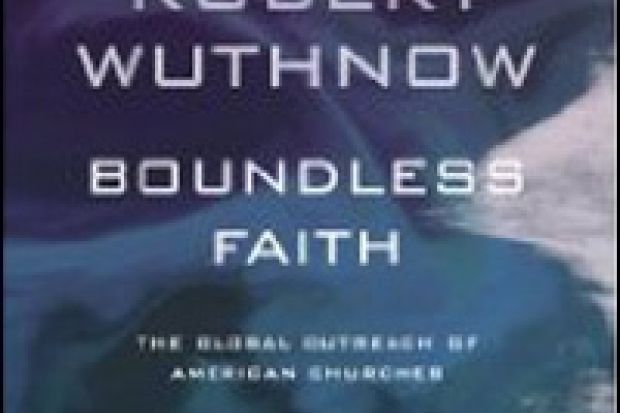Robert Wuthnow has been one of the leading and most prolific sociological commentators on American religion for the past three decades. His most recent book, true to form, is topical and grounded in rigorous empirical research; data gathered via the nationwide Global Issues Survey are supplemented by more than 300 interviews with church leaders, mission agency staff and rank-and-file church members.
Boundless Faith is about American Christianity as a global phenomenon: its scope as a religious force, the nature of its global influence and the implications of this global outreach for religious life in the contemporary US.
The Christianity that took root in the virgin US was always more entrepreneurial, more doggedly creative, more prone to break out of its immediate geographical boundaries than the staid churchmanship of its British forebears. From the 19th century, this included overseas missionary endeavour, as American Christians took their faith to far-off lands to preach its message and assist the poor and disenfranchised. This dual emphasis upon converting the heathen and providing for the needy remains a persistent tension among missionaries today and Wuthnow sets his analysis within a history that, given the economic and cultural power of the US, has inevitably involved accusations of cultural imperialism and religious intolerance.
One of Wuthnow's achievements in this book is to throw into question the common assumption that American missionaries constitute a homogeneous movement - morally conservative, culturally ill-informed and preoccupied by a passion to export an Americanised brand of Christian piety. His historical perspective generates a nuanced picture, highlighting the ways that missionary endeavour has been shaped by a changing set of organisational and financial circumstances; from denominational mission boards in the 19th century to independent missionary agencies and, now, faith-based NGOs, which are financed largely by government grants with the inevitable strings attached.
Some recent studies have claimed that the axis of global Christianity has shifted from the advanced West to the "Two thirds World", an argument that is echoed in accounts of thriving Pentecostals in Latin America and African evangelicals leading moral campaigns across the Anglican Communion. Wuthnow offers an incisive critique of this "global Christianity paradigm", arguing that globalisation demands an acknowledgement not only of religious vitality in the global South, but also of the "cultural and organisational mechanisms through which Christianity in its scattered global locations has become more intricately connected".
He makes a strong case that US Christianity is at the heart of these networks and has become increasingly engaged in global issues in recent decades. This is not just a priority for the evangelical churches, but remains a core activity for mainline Protestants and Roman Catholics, fostering in all cases a greater sense of identity with a global community.
Wuthnow is wisely ambivalent about the effectiveness of Christian mission in alleviating suffering in the Third World; "gospel tourism" and the misdirection of resources are persistent handicaps. However, he does discover that those Christians most directly involved find mission work relativises how they think about the US, encouraging a more critical perspective on Western materialism and a greater sense of responsibility towards the less fortunate.
In a chapter on the influence of Christianity on foreign-policy initiatives, Wuthnow argues that relationships between political and religious organisations often have more to do with rhetoric and public posturing than anything resembling uncritical partisanship. While Christian organisations lobby politicians and claim their ideological loyalty, it is naive to assume foreign-policy decisions are made simply as a consequence of this relationship (economics and political self-preservation often taking precedence over specifically religious concerns).
Wuthnow's analysis is a welcome corrective to more journalistic perspectives that find conspiracy and controversy all too readily, especially in the wake of 9/11 and the Iraq war. However, in my view, he moves a little too far in the other direction.
He may be right in stressing the public stage as the main arena of religio-political manoeuvring, and indeed claims of political partnership may convey more style than substance. But when US citizens depend so heavily on the mass media for their knowledge of world events, including political and humanitarian disasters that carry acute religious resonance, it would be a mistake to overlook the importance of such public discourses. They may veil more complex relationships among the religio-political elite, but they also constitute a major force in shaping public opinion.
Boundless Faith: The Global Outreach of American Churches
By Robert Wuthnow. University of California Press 360pp, £15.95. ISBN 9780520259157. Published 8 May 2009
Register to continue
Why register?
- Registration is free and only takes a moment
- Once registered, you can read 3 articles a month
- Sign up for our newsletter
Subscribe
Or subscribe for unlimited access to:
- Unlimited access to news, views, insights & reviews
- Digital editions
- Digital access to THE’s university and college rankings analysis
Already registered or a current subscriber? Login
